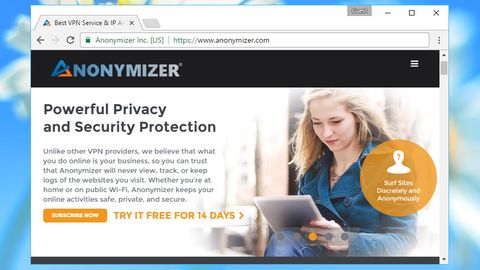TechRadar Verdict
We like the lengthy trial and guarantee periods, but the core product just isn't strong enough to make it worth your time or money.
Pros
- +
14-day trial
- +
45-day money-back guarantee
- +
No logging
Cons
- -
Only two locations
- -
Trial restricted to one location
- -
Oddly designed Windows client
- -
No monthly plan
Why you can trust TechRadar
Note: Anonymizer has been discontinued as of February 2020. The company advises that: “For personal privacy and VPN services, we strongly recommend and endorse InvinciBull.”
The original review follows below…
Anonymizer is a popular US-based service that has been protecting the privacy of its users for more than 20 years.
The Anonymizer website lists some appealing features: this VPN works on just about every platform (much like competitors like ExpressVPN and NordVPN, there’s absolutely no logging, plus support for up to 6 devices. It's not so up-front with the list of locations, probably because there are only two: San Diego and Amsterdam.
- Want to try Anonymizer? Check out the website here
The service offers what it calls a 14-day trial with no payment details required, but there's a catch. You can only use the Amsterdam server, which is no help at all if you'll mostly be connecting to San Diego.
Anonymizer does give you the security of a 45-day money-back guarantee, but even that is spoiled by another catch. There's no single month payment option where you can try the service at minimal cost, so you must pay a year up-front for $6.67 (£5.40, AU$8.80) a month.
Privacy
You don't have to look far to find Anonymizer's logging policy, as it's proudly displayed on the VPN plan summary: "ZERO Logging – None, no records of ANY of your online activity". No ambiguity there.
Searching for further detail in the small-print takes a while, mostly because it's around 13,000 words long. A lot of this is because Anonymizer includes OpenVPN, OpenSSL and other licence agreements in the text, but that's little consolation when you're scrolling, and scrolling, and scrolling down the page wading through it all.
When we did find privacy references they generally confirmed the no logging policy: "Anonymizer keeps no record of internet protocol addresses visited attributable to your account", and: "Anonymizer cannot correlate other than in real time any individual user with a visit of any individual website."
There was one unusual ‘disallowed uses’ clause which may affect some: "You agree not to use a robot, such as ReGet, GetRight, Go!Zilla, or any similar programs, to download content continuously..."
The small-print also points out that the service is for personal, non-commercial use.
On the plus side, the refund policy mentions no bandwidth limits or other restrictions. If you want your cash back, just email and ask within the first 45 days.
- We’ve rounded up the best free VPN services
Performance
Setting up Anonymizer wasn't difficult, at least on our test Windows system. We downloaded and installed the client and it took care of the tricky bits itself.
The client's interface was awkward to use. The main window looks like a regular Windows dialog, but can't be moved – it's always in a fixed position at the bottom right of the screen. If you click away on another desktop window the client minimises to your system tray, even if you were doing something. And when you initially connect, your status gets displayed in a separate window which stays on top of all the others (fortunately you can make this disappear).
You do get some handy settings, including the LeakBlocker (blocks all internet traffic if the VPN connection drops) and Access Control lists (define which sites you can visit, and which you can't, when the VPN is active).
In our testing*, Anonymizer's performance was difficult to assess. As mentioned, there are only two locations, but we couldn't use our regular tests, as for some reason the Speedtest.net site wouldn't deliver usable results when connected.
Turning to other sites suggested we were getting download rates from 12Mbps to 28Mbps, depending on the location and time, but we have less confidence in those figures than usual. Be sure to run your own in-depth speed tests if you trial the service yourself.
Final verdict
Anonymizer's unusually lengthy trial and money-back guarantee are strong points, but most of that enthusiasm disappeared once we realised there were only two locations, and overall there aren't enough reasons to keep using the service once your trial is up.
- We've also highlighted the best VPNs

Mike is a lead security reviewer at Future, where he stress-tests VPNs, antivirus and more to find out which services are sure to keep you safe, and which are best avoided. Mike began his career as a lead software developer in the engineering world, where his creations were used by big-name companies from Rolls Royce to British Nuclear Fuels and British Aerospace. The early PC viruses caught Mike's attention, and he developed an interest in analyzing malware, and learning the low-level technical details of how Windows and network security work under the hood.

The obscure little PC that wanted to be a big NAS — super compact Maiyunda M1 doesn't cost that much, offers up to 40TB SSD storage, runs Windows and has 4 Gigabit Ethernet ports

Image site Abload going offline reminds me of how much online content we've permanently lost

Gemini's next evolution could let you use the AI while you browse the internet
